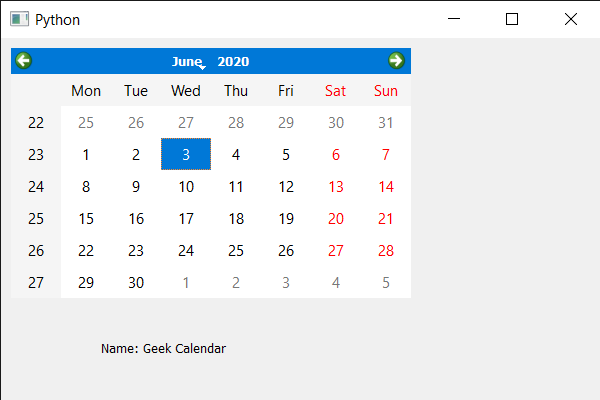En este artículo veremos cómo podemos obtener la propiedad name del QCalendarWidget. La propiedad de nombre contiene el nombre del calendario, el nombre se usa para distinguir el calendario entre sí, es decir, clasificarlos según el uso, por ejemplo, calendario de nacimiento, calendario de reservas, etc. Por defecto, la propiedad de nombre contiene una string vacía, aunque podemos establecer el nombre en cualquier momento con la ayuda del setAccessibleNamemétodo.
Para hacer esto, usaremos
accessibleNameel método con el objeto QCalendarWidget.Sintaxis: calendario.nombreAccesible()
Argumento: no requiere argumento
Acción realizada: devuelve una string
A continuación se muestra la implementación.
Python3
# importing libraries
from PyQt5.QtWidgets import *
from PyQt5 import QtCore, QtGui
from PyQt5.QtGui import *
from PyQt5.QtCore import *
import sys
class Window(QMainWindow):
def __init__(self):
super().__init__()
# setting title
self.setWindowTitle("Python ")
# setting geometry
self.setGeometry(100, 100, 600, 400)
# calling method
self.UiComponents()
# showing all the widgets
self.show()
# method for components
def UiComponents(self):
# creating a QCalendarWidget object
calender = QCalendarWidget(self)
# setting geometry to the calendar
calender.setGeometry(10, 10, 400, 250)
# setting name
calender.setAccessibleName("Geek Calendar")
# creating a label
label = QLabel(self)
# setting geometry to the label
label.setGeometry(100, 280, 250, 60)
# making label multi line
label.setWordWrap(True)
# getting name
value = calender.accessibleName()
# setting text to the label
label.setText("Name: " + str(value))
# create pyqt5 app
App = QApplication(sys.argv)
# create the instance of our Window
window = Window()
# start the app
sys.exit(App.exec())
Producción :
Publicación traducida automáticamente
Artículo escrito por rakshitarora y traducido por Barcelona Geeks. The original can be accessed here. Licence: CCBY-SA